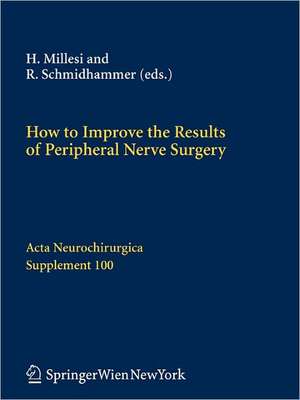How to Improve the Results of Peripheral Nerve Surgery: Acta Neurochirurgica Supplement, cartea 100
Editat de Hanno Millesi, Robert Schmidhammeren Limba Engleză Paperback – 6 noi 2010
Din seria Acta Neurochirurgica Supplement
- 5%
 Preț: 1798.83 lei
Preț: 1798.83 lei - 5%
 Preț: 1445.88 lei
Preț: 1445.88 lei - 5%
 Preț: 1102.31 lei
Preț: 1102.31 lei - 5%
 Preț: 1136.85 lei
Preț: 1136.85 lei - 5%
 Preț: 811.16 lei
Preț: 811.16 lei - 5%
 Preț: 1112.70 lei
Preț: 1112.70 lei - 5%
 Preț: 529.81 lei
Preț: 529.81 lei - 5%
 Preț: 791.25 lei
Preț: 791.25 lei - 5%
 Preț: 1303.26 lei
Preț: 1303.26 lei - 5%
 Preț: 410.88 lei
Preț: 410.88 lei - 5%
 Preț: 345.71 lei
Preț: 345.71 lei - 5%
 Preț: 1316.08 lei
Preț: 1316.08 lei - 5%
 Preț: 1452.28 lei
Preț: 1452.28 lei - 5%
 Preț: 1348.49 lei
Preț: 1348.49 lei - 5%
 Preț: 370.94 lei
Preț: 370.94 lei - 5%
 Preț: 376.22 lei
Preț: 376.22 lei - 5%
 Preț: 715.00 lei
Preț: 715.00 lei - 5%
 Preț: 364.17 lei
Preț: 364.17 lei - 5%
 Preț: 365.82 lei
Preț: 365.82 lei - 5%
 Preț: 366.91 lei
Preț: 366.91 lei - 5%
 Preț: 384.08 lei
Preț: 384.08 lei - 5%
 Preț: 397.16 lei
Preț: 397.16 lei - 5%
 Preț: 367.64 lei
Preț: 367.64 lei - 5%
 Preț: 373.12 lei
Preț: 373.12 lei - 5%
 Preț: 993.13 lei
Preț: 993.13 lei - 5%
 Preț: 394.07 lei
Preț: 394.07 lei - 5%
 Preț: 364.74 lei
Preț: 364.74 lei - 5%
 Preț: 1824.10 lei
Preț: 1824.10 lei - 5%
 Preț: 1119.31 lei
Preț: 1119.31 lei - 5%
 Preț: 1312.12 lei
Preț: 1312.12 lei - 5%
 Preț: 1119.68 lei
Preț: 1119.68 lei - 5%
 Preț: 1331.78 lei
Preț: 1331.78 lei - 5%
 Preț: 1430.72 lei
Preț: 1430.72 lei - 5%
 Preț: 1405.49 lei
Preț: 1405.49 lei - 5%
 Preț: 1418.48 lei
Preț: 1418.48 lei - 5%
 Preț: 392.25 lei
Preț: 392.25 lei - 5%
 Preț: 1335.46 lei
Preț: 1335.46 lei - 5%
 Preț: 1375.23 lei
Preț: 1375.23 lei
Preț: 1095.90 lei
Preț vechi: 1153.57 lei
-5% Nou
Puncte Express: 1644
Preț estimativ în valută:
209.73€ • 218.15$ • 173.14£
209.73€ • 218.15$ • 173.14£
Carte tipărită la comandă
Livrare economică 14-28 aprilie
Preluare comenzi: 021 569.72.76
Specificații
ISBN-13: 9783211999042
ISBN-10: 3211999043
Pagini: 193
Ilustrații: IX, 184 p.
Dimensiuni: 210 x 277 x 15 mm
Greutate: 0.46 kg
Ediția:Softcover reprint of hardcover 1st ed. 2007
Editura: SPRINGER VIENNA
Colecția Springer
Seria Acta Neurochirurgica Supplement
Locul publicării:Vienna, Austria
ISBN-10: 3211999043
Pagini: 193
Ilustrații: IX, 184 p.
Dimensiuni: 210 x 277 x 15 mm
Greutate: 0.46 kg
Ediția:Softcover reprint of hardcover 1st ed. 2007
Editura: SPRINGER VIENNA
Colecția Springer
Seria Acta Neurochirurgica Supplement
Locul publicării:Vienna, Austria
Public țintă
ResearchCuprins
Surgery on the nerve.- The potential of electrical stimulation to promote functional recovery after peripheral nerve injury — comparisons between rats and humans.- Surgical technique for the treatment of C5 and C6 root avulsion.- Lumbosacral plexus lesions.- Microsurgical management of penetrating peripheral nerve injuries: pre, intra-and postoperative analysis and results.- An evaluation using techniques to assess muscle and nerve regeneration of a flexible glass wrap in the repair of peripheral nerves.- Analysis of the dose-response of N-acetylcysteine in the prevention of sensory neuronal loss after peripheral nerve injury.- Did the partial contralateral C7-transfer fulfil our expectations? Results after 5 year experience.- Bridging defects: autologous nerve grafts.- The allogenic nerve graft.- Alternative techniques for peripheral nerve repair: conduits and end-to-side neurorrhaphy.- The beneficial effect of genetically engineered Schwann cells with enhanced motility in peripheral nerve regeneration: review.- Schwann cells, acutely dissociated from a predegenerated nerve trunk, can be applied into a matrix used to bridge nerve defects in rats.- Comparative neuro tissue engineering using different nerve guide implants.- The “bioartificial living nerve graft”..- Nerve regeneration using tubular scaffolds from biodegradable Polyurethane.- A new technique of autogenous conduits for bridging short nerve defects. An experimental study in the rabbit.- End-to-side nerve neurorrhaphy: critical appraisal of experimental and clinical data.- Ingrowth of sensory axons into an end-to-side coapted nerve stump after donor nerve crush in the rat.- Which myelinated sensory axons sprout into an end-to-side coapted peripheral nerve in the rat?.- Functional recovery and mechanismsin end-to-side nerve repair in rats.- Synergistic terminal motor end-to-side nerve graft repair: investigation in a non-human primate model.- End-to-side coaptation — controversial research issue or important tool in human patients.- Cerebral plasticity.- Cortical reintegration of a replanted hand and an osseointegrated thumb prosthesis.- Cortical motor activation patterns following hand transplantation and replantation.- Coordinated function oriented movements after multiple root avulsion.- Enhanced sensory relearning after nerve repair by using repeated forearm anaesthesia: aspects on time dynamics of treatment.- Enhanced sensory re-learning after nerve repair using 3D audio-visual signals and kinaesthesia — preliminary results.- Compression and irritation syndromes.- Anatomical structures to provide passive motility of peripheral nerve trunks and fascicles.- Critical review of pathophysiologic mechanisms in thoracic outlet syndrome (TOS).- TOS-surgery via a single supraclavicular incision.- Thoracic outlet syndrome: a multidisciplinary problem with a perspective for microsurgical management without rib resection.- Neurosurgical prevention of ulceration and amputation by decompression of lower extremity peripheral nerves in diabetic neuropathy: update 2006.- Muscle.- IMF®-Therapy (Intention controlled Myo-Feedback) — an innovative method in the treatment of peripheral nerve lesions.- In peripheral nerve regeneration environment enriched with activity stimulating factors improves functional recovery.- Cognitive re-education and early functional mobilisation in hand therapy after bilateral hand transplantation and heterotopic hand replantation — two case reports.- Functional, morphological and biomolecular assessment of posttraumatic neuro-muscular recovery inthe rat forelimb model.- Surgery on muscles in consequence of peripheral nerve lesions.
Caracteristici
Particular information to improve the results of peripheral nerve regeneration Overview on the problem from all different aspects Actual questions like end to side coaptation are discussed Includes supplementary material: sn.pub/extras
